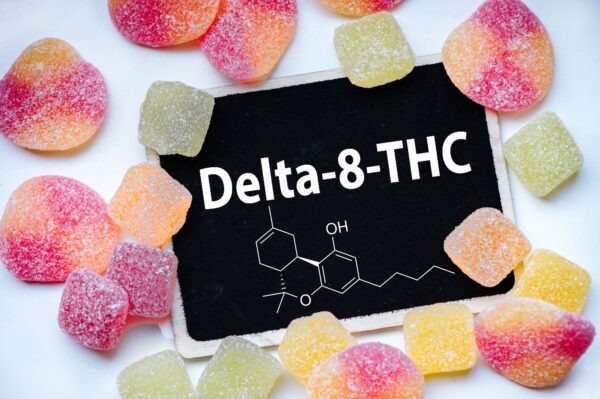The world of cannabis is evolving rapidly, with new compounds and derivatives gaining popularity among consumers. One such compound that has captured significant attention is Delta-8 THC, a semi-synthetic cannabinoid that offers a unique experience compared to its more famous cousin, Delta-9 THC. Genesis Reference Labs will explore the increasing popularity of Delta-8 THC, delve into its chemical structure, examine how it differs from Delta-9 THC, and discuss the complex legal and regulatory landscape surrounding its use across different states.
Understanding Delta-8 THC: A Chemical Overview
Delta-8 THC, short for Delta-8-tetrahydrocannabinol, is a cannabinoid found in trace amounts in the cannabis plant. Unlike Delta-9 THC, the primary psychoactive compound in cannabis, Delta-8 THC is less abundant and often requires chemical conversion from CBD (cannabidiol) or Delta-9 THC to produce it in significant quantities. This process involves altering the chemical structure of CBD or Delta-9 THC through heat, solvents, and catalysts to create Delta-8 THC.
Chemically, Delta-8 THC and Delta-9 THC are similar, with only a slight difference in their molecular structures. Both cannabinoids have a double bond in their chemical structure, but the placement of this bond varies. Delta-8 THC has the double bond on the eighth carbon atom in its chain, while Delta-9 THC has it on the ninth. This seemingly minor difference leads to distinct effects and interactions within the human body, contributing to the growing interest in Delta-8 THC.
The Unique Effects of Delta-8 THC
The subtle variation in the chemical structure between Delta-8 and Delta-9 THC results in different pharmacological effects. Delta-8 THC is often described as providing a milder, more clear-headed high compared to Delta-9 THC. Many users report feeling relaxed and euphoric without the intense psychoactive effects or anxiety sometimes associated with Delta-9 THC. This makes Delta-8 THC an attractive option for those who seek the therapeutic benefits of THC without the overwhelming high.
Additionally, Delta-8 THC is believed to have a lower psychoactive potency than Delta-9 THC, making it more suitable for individuals who are sensitive to the effects of traditional cannabis.
The Popularity Surge: Why Delta-8 THC is Gaining Traction
The rise of Delta-8 THC can be attributed to several factors. First, the legal status of Delta-9 THC remains complicated, with varying levels of acceptance and regulation across the United States. Delta-8 THC, being a semi-synthetic derivative, has found a niche market, especially in states where Delta-9 THC is restricted or illegal.
Another significant factor contributing to Delta-8 THC’s popularity is the growing demand for alternative cannabinoids that offer distinct effects. As consumers become more educated about cannabis and its many compounds, there is an increasing desire to explore beyond the well-known cannabinoids like Delta-9 THC and CBD. Delta-8 THC offers a novel experience, attracting both seasoned cannabis users and newcomers seeking a more controlled and manageable high.
Furthermore, the ease of access to Delta-8 THC products, including edibles, tinctures, and vape cartridges, has made it widely available in the market. The rise of online retailers and the proliferation of brick-and-mortar shops dedicated to CBD and cannabis-related products have also played a significant role in making Delta-8 THC more accessible to the general public.
Legal and Regulatory Landscape of Delta-8 THC
The legal status of Delta-8 THC is complex and rapidly evolving. The 2018 Farm Bill, which legalized hemp and its derivatives, has indirectly influenced the legality of Delta-8 THC. Since Delta-8 THC can be derived from hemp, many argue that it is federally legal as long as it contains less than 0.3% Delta-9 THC. However, the semi-synthetic nature of Delta-8 THC and its psychoactive properties have led to legal gray areas.
Several states have moved to regulate or ban Delta-8 THC, citing concerns about its psychoactive effects and lack of regulation. As of now, states like Alaska, Colorado, New York, and Washington have implemented restrictions or outright bans on the sale and possession of Delta-8 THC. On the other hand, states where cannabis is fully legalized, such as California and Oregon, have allowed the sale of Delta-8 THC products, albeit with certain regulations.
The Food and Drug Administration (FDA) has also expressed concerns about the safety and marketing of Delta-8 THC products, warning consumers about potential health risks and the lack of standardized testing. The FDA’s stance has prompted further debate about the need for federal regulation and oversight of Delta-8 THC products to ensure consumer safety.
The Future of Delta-8 THC
The future of Delta-8 THC remains uncertain, as it navigates the intricate web of state and federal regulations. While its popularity continues to grow, so does the scrutiny from regulatory bodies and lawmakers. The ongoing debate about the safety, legality, and therapeutic potential of Delta-8 THC will likely shape its market presence in the coming years.
Consumers interested in Delta-8 THC should stay informed about the legal status in their respective states and approach its use with caution, especially given the lack of comprehensive research and regulation. As the cannabis industry evolves, so too will the landscape for cannabinoids like Delta-8 THC, potentially leading to more clarity and standardization in the future.
In conclusion, Delta-8 THC represents a fascinating development in the world of cannabis, offering a unique alternative to traditional THC products. Its rise in popularity reflects the growing interest in cannabis-derived compounds and the ongoing evolution of the cannabis market. However, its semi-synthetic nature, legal ambiguity, and potential health risks warrant careful consideration and regulation to ensure consumer safety and informed use.
